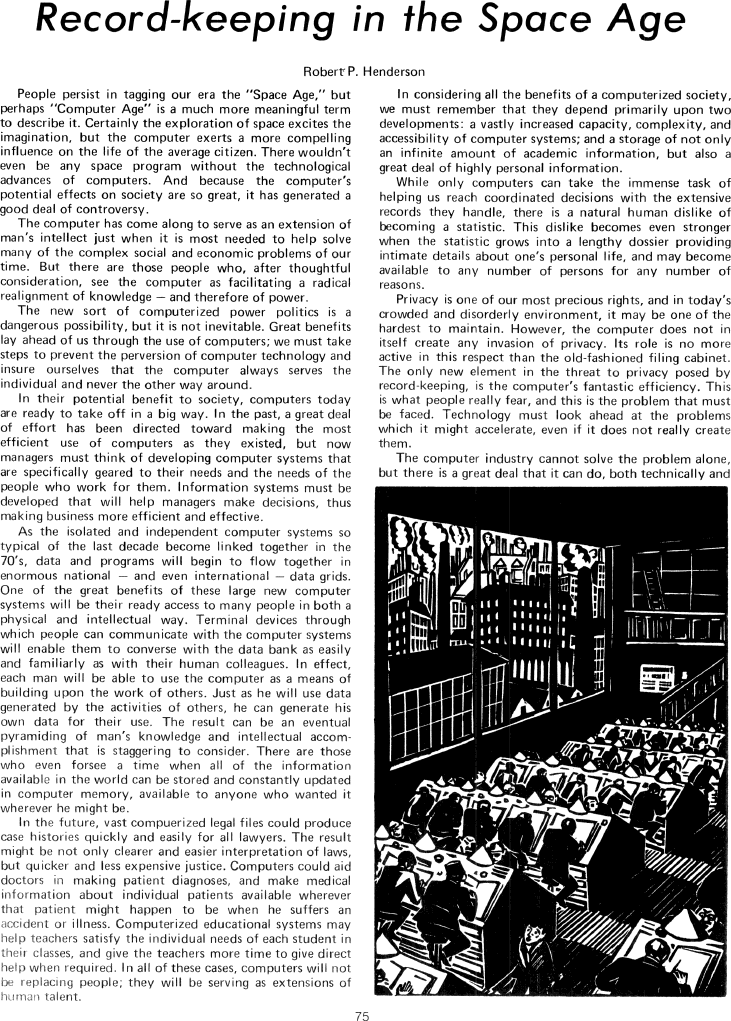The Best of Creative Computing Volume 1 (published 1976)
Record-keeping in the Space Age (data grids, privacy)

Record-keeping in the Space Age
Robert P. Henderson
People persist in tagging our era the "Space Age," but perhaps "Computer Age" is
a much more meaningful term to describe it. Certainly the exploration of space
excites the imagination, but the computer exerts a more compelling influence on
the life of the average citizen. There wouldn't even be any space program
without the technological advances of computers. And because the computer's
potential effects on society are so great, it has generated a good deal of
controversy.
The computer has come along to serve as an extension of man's intellect just
when it is most needed to help solve many of the complex social and economic
problems of our time. But there are those people who, after thoughtful
consideration, see the computer as facilitating a radical realignment of
knowledge - and therefore of power.
The new sort of computerized power politics is a dangerous possibility, but it
is not inevitable. Great benefits lay ahead of us through the use of computers;
we must take steps to prevent the perversion of computer technology and insure
ourselves that the computer always serves the individual and never the other way
around.
In their potential benefit to society, computers today are ready to take off in
a big way. In the past, a great deal of effort has been directed toward making
the most efficient use of computers as they existed, but now managers must think
of developing computer systems that are specifically geared to their needs and
the needs of the people who work for them. Information systems must be developed
that will help managers make decisions, thus making business more efficient and
effective.
As the isolated and independent computer systems so typical of the last decade
become linked together in the 70's, data and programs will begin to flow
together in enormous national - and even international - data grids. One of the
great benefits of these large new computer systems will be their ready access to
many people in both a physical and intellectual way. Terminal devices through
which people can communicate with the computer systems will enable them to
converse with the data bank as easily and familiarly as with their human
colleagues. In effect, each man will be able to use the computer as a means of
building upon the work of others. Just as he will use data generated by the
activities of others, he can generate his own data for their use. The result can
be an eventual pyramiding of man's knowledge and intellectual accomplishment
that is staggering to consider. There are those who even forsee a time when all
of the information available in the world can be stored and constantly updated
in computer memory, available to anyone who wanted it wherever he might be.
In the future, vast compuerized legal files could produce case histories quickly
and easily for all lawyers. The result might be not only clearer and easier
interpretation of laws, but quicker and less expensive justice. Computers could
aid doctors in making patient diagnoses, and make medical information about
individual patients available wherever that patient might happen to be when he
suffers an accident or illness. Computerized educational systems may help
teachers satisfy the individual needs of each student in their classes, and give
the teachers more time to give direct help when required. In all of these cases,
computers will not be replacing people; they will be serving as extensions of
human talent.
In considering all the benefits of a computerized society, we must remember that
they depend primarily upon two developments: a vastly increased capacity,
complexity, and accessibility of computer systems; and a storage of not only an
infinite amount of academic information, but also a great deal of highly
personal information.
While only computers can take the immense task of helping us reach coordinated
decisions with the extensive records they handle, there is a natural human
dislike of becoming a statistic. This dislike becomes even stronger when the
statistic grows into a lengthy dossier providing intimate details about one's
personal life, and may become available to any number of persons for any number
of reasons.
Privacy is one of our most precious rights, and in today's crowded and
disorderly environment, it may be one of the hardest to maintain. However, the
computer does not in itself create any invasion of privacy. Its role is no more
active in this respect than the old-fashioned filing cabinet. The only new
element in the threat to privacy posed by record-keeping, is the computer's
fantastic efficiency. This is what people really fear, and this is the problem
that must be faced. Technology must look ahead at the problems which it might
accelerate, even if it does not really create them.
The computer industry cannot solve the problem alone, but there is a great deal
that it can do, both technically and
75


